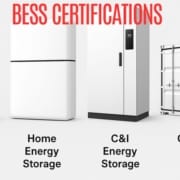BESS Certifications Explained: What You Need to Know Before You Buy or Sell
BESS Certifications: Battery Energy Storage Systems (BESS) are becoming a critical part of our renewable energy future. Whether you’re buying, selling, installing, or manufacturing BESS units, understanding the required certifications is crucial. Without proper certifications, your product may not be legally sold, safely operated, or even insured in many regions.
In this blog, we’ll break down the most important certifications for BESS and explain what they mean, why they matter, and how to ensure your system is compliant.
1. Why Are BESS Certifications Important?
Certifications are like a stamp of approval from trusted organizations. They prove that a BESS unit has passed safety, performance, and environmental tests. Without them:
- You risk safety issues like fires or system failure.
- Your product might be blocked from certain markets.
- Insurance claims can be denied after accidents.
- You might face legal problems or product recalls.
2. BESS Certifications Common Global Standards
Different countries and regions have different certification requirements. Here are some of the most common ones globally:
A. UL Standards (Mainly for North America)for BESS Certifications
UL (Underwriters Laboratories) is a leading safety organization in the U.S. These are some key UL standards for BESS:
- UL 9540 – Safety for Energy Storage Systems and Equipment
- UL 9540A – Thermal Runaway Fire Propagation Testing
- UL 1973 – Batteries for Use in Stationary and Motive Applications
- UL 1741 – Inverters, Converters, and Controllers for Use in Independent Power Systems
Why it matters: UL certifications are essential for selling in the U.S. and Canada. Without these, your product won’t be accepted in most residential or commercial projects.
B. IEC Standards (International) for BESS
The International Electrotechnical Commission (IEC) sets safety and performance standards recognized worldwide.
- IEC 62619 – Safety for Secondary Lithium Cells and Batteries
- IEC 62933 – Series of standards for energy storage systems
- IEC 62133 – Safety for portable sealed secondary cells
- IEC 61427 – Performance of batteries used in renewable energy systems
Why it matters: Many countries outside North America refer to IEC standards for regulatory compliance, especially in Europe, Asia, and the Middle East.
C. CE Marking (Europe)
Products sold in the European Union must meet CE requirements. For BESS, this includes:
- EMC (Electromagnetic Compatibility)
- LVD (Low Voltage Directive)
- RoHS (Restriction of Hazardous Substances)
- Safety & Fire Protection
Why it matters: Without CE marking, you can’t legally sell your BESS product in the European Economic Area (EEA).
D. BIS (India)
In India, the Bureau of Indian Standards (BIS) regulates battery and BESS imports and production.
- IS 16270 – For lithium-ion battery safety
- IS 17855 – Latest standards aligning with international norms
Why it matters: India is a growing BESS market, and local certifications are mandatory for government tenders and utility-scale projects.
E. CEC (Australia)
The Clean Energy Council (CEC) governs renewable energy products in Australia.
- Products must be on the CEC approved list
- Certifications must include both product testing and installer compliance
Why it matters: BESS products not listed with the CEC are ineligible for rebates or connection to the grid.
3. Certification for the Entire System, Not Just the Cell
One major mistake people make is assuming that a certified cell means the entire battery system is certified. That’s not true.
A complete BESS includes:
- Battery cells or packs
- Battery Management System (BMS)
- Power Conversion System (PCS)
- Cooling systems, enclosures, cables, and connectors
Each component AND the fully assembled system must meet certification standards.
4. Factory-Level Certifications
Besides product certifications, the factory that makes your BESS should also be certified:
- ISO 9001 – Quality Management
- ISO 14001 – Environmental Management
- ISO 45001 – Occupational Health & Safety
- IATF 16949 – (If automotive-related BESS)
Why it matters: Certified factories reduce the risk of defects, improve traceability, and meet import regulations more smoothly.
5. Who Issues These Certifications?
- UL – Underwriters Laboratories (USA)
- TÜV – Germany-based, issues CE and IEC certifications
- Intertek – Testing and certification services globally
- SGS – Certification body with international presence
- CSA – Canadian Standards Association
Always work with internationally recognized certification bodies for credibility and global market acceptance.
6. Red Flags to Watch Out For
- Only cell report is shown – This is not enough! Ask for system-level reports.
- No thermal runaway test (UL 9540A) – Risk of fire is very high without this.
- Non-recognized lab – Some factories use fake or local-only reports.
- Outdated reports – Certification validity matters. Check the dates.
- No factory audit certificates – Poor factory management = higher product risk.
7. Tips for Buyers & Project Developers
- Always request full certification reports, not just summaries.
- Ask for the name of the lab and the full system test, not just component tests.
- Make sure the certification is valid for the target market (UL for USA, CE for Europe, etc.)
- Work with verified sourcing or consulting agents who understand the compliance rules.
Conclusion
BESS certifications are not just paperwork—they’re your protection against risk, rejection, and regulatory trouble. Whether you’re importing, installing, or investing in energy storage systems, certification is your first line of defense.
Make sure your BESS is properly tested, certified, and factory-audited to avoid future headaches. If you’re not sure, work with local experts who can help verify everything before the deal is done.
Need Help?
If you’re buying BESS from China or anywhere else, and you want to make sure the product is safe and certified, I can help. I do:
- Factory checks
- Certification report verification
- BESS system inspections
- Compliance guidance for your target market
Let’s make your BESS project safer, faster, and fully compliant.


